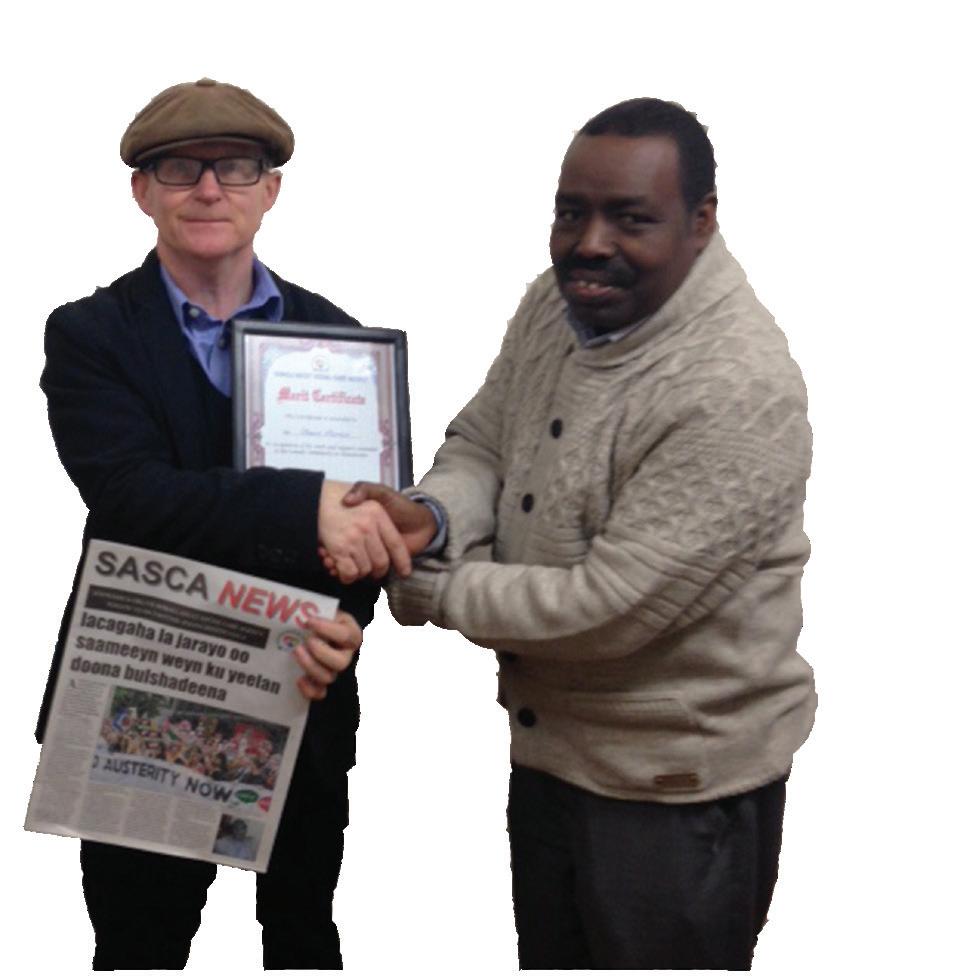
3 minute read
Mariam is honoured for her work with asylum seekers
Show respect to your parents
By Mawliid Nuur
Advertisement
IN SOMALI culture, parents have special rights and are highly respected by their children, which obligates them to fulfil their religious and cultural duties.
Within Somali culture, it is believed that if a person fails to meet such obligations, they will meet divine, negative consequences.
During the olden times when the majority of the Somalis were nomads, there was a father who had a son and loved him very much.
The father cared the son very much and after years, the father grew old and became blind. Therefore, it fell upon the son to take care of his dad.
One day they went on a journey and after walking for a while, the son told the father to wait for him, and the father asked the son where they were.
The son told the father where they were, stating that they were under well-known tree. The father sadly said: “Carry on your journey, I know that you will never come back”.
The surprised son asked why, and then the father said: “This is the spot where I left my dad in a similar situation so I know this is the consequence of my action.”
Advertise your business here
WOULD like to advertise your business, product, service or even your big day?
If so then SASCA is ready to do it for you at a very low price in our newspaper. Please contact our marketing department on the following contact details for a quote.
Ahmed Mohamed Tel: 0161 227 7966/0750 3957488. Email: info@sasca.org. uk or Ahmedmohamed450@hotmail.com
Tell us your news
HAVE you got an event you would like reporting in Sasca News? Then we would love to hear from you. Whether it’s a community event or simply something you simply want to get off your chest, send it to us at info@ sasca.org.uk
A SOMALI woman who works with women refugees in Manchester has been named Woman of the Year in a prestigious awards ceremony.
Mariam Yusuf, who helps run a support group called Women Asylum Seeks Together (WAST), was presented with the award for her work with women who have fled violence in their own countries.
The awards are organised by the UN Refugee Agency (UNHCR) and Migrants Organise and seeks to raise the profile of women refugees.
Like many other asylum seekers in the UK, Mariam says she is “stuck in limbo” unable to work or claim benefits and reliant on handouts from charities to survive.
Mariam, who is a member of minority Bajuni tribe, arrived in the UK in 2008 with no English and having been separated from her two children. She was caught up in the asylum system for six years, during which she was detained in Yarl’s Wood, and made destitute and homeless.
But despite the extreme hardship and injustice that she has suffered, Mariam learned
English, made friends, stood up for herself and went on to provide essential support to many other women in need of support.
She told Sasca News: “Most of us have been victims of detention and have been traumatised. We are campaigning for the closure of detention centres and are planning a protest with the choir at the reporting centre in Manchester. We don’t sing for entertainment but to raise awareness and campaign.
“Most of the people who come to WAST are destitute and need a place where they can feel at home. They are homeless and don’t have a place to go. They live with friends and can become vulnerable to abusive relationships.”
Mariam, 38, said that winning the award has given her “the courage and energy to go out there and do more”.
Together with her family, she fled Somalia’s civil war in 1991 and ended up in the Jomvu refugee camp in the Kenyan port city of Mombasa, where she became pregnant .
Ashamed that she was having a child outside of marriage, her family arranged for Miriam to marry an older man from the same tribe. But he was already married and Yusuf says his other wife physically and mentally abused her.
Miriam lost contact with her husband and when her brother was killed. Her father told her to flee to Europe, saying he would follow with her two children.
She has lost contact with her children but thinks they may be in Kenya.
For three years, she was homeless, living with friends in London before coming to Manchester. Here she found a place to live with other female asylum seekers through a Christian charity called the Boaz Trust which helps destitute asylum seeks.
Miriam is a vocal member of WAST and is part of the group’s choir.
WAST provides a twice-weekly drop-in center for female asylum seekers and organises awareness campaigns, including running the choir, producing plays and giving workshops in schools about the dangers of FGM.








